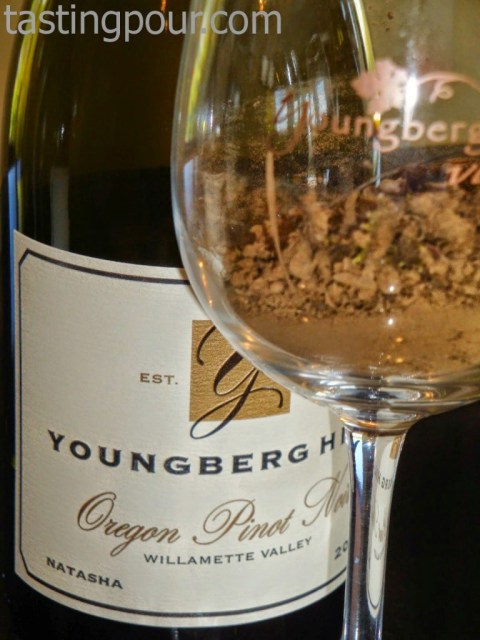Wayne Bailey learned a phrase from the farmer/winemakers of Burgundy, “The best fertilizer is your footprint.” He incorporates this idea during his daily 6 a.m. walks of the vineyard at Youngberg Hill in McMinnville, Oregon.
 |
| Views from Tasting Deck at Youngberg Hill Vineyards and Inn |
Biodynamic Farming
Youngberg Hill is farmed using the principles of biodynamics. Biodynamic viticulture is like organic on steroids (if steroids were chemical free). “Organic only tells you what not to do,” Wayne explains. Wayne uses the word “holistic” or “seriously organic” and explains these practices are designed to work with the balance of nature. The key is “allowing” nature to be in balance, not “making sure” nature is in balance. “I watch what nature is trying to do and only interfere when it is struggling and I can help it go in the direction it wants to go.
We pointed out that some think biodynamics involves dancing naked in the vineyard by moonlight. “What’s wrong with that?” Wayne answers with a chuckle. He relates biodynamic farming to the old school practices of planting by the Farmer’s Almanac.
 |
| “Cow are the most holistic animal for the vineyard,” Wayne Bailey |
Biodynamic Winemaking
The philosophy of minimal interference does not end in the vineyard but extends into the winemaking process. Wayne believes in letting the grapes “do their thing.” He relates it to parenting. “Don’t try to make a rocket scientist out of a concert pianist.” He would instead focus on helping the concert pianist be the best he/she could be. Likewise he raises grapes for their best attributes and allows the wine to express the vineyard block and vintage… And the differences are noticeable. Even winemakers from other states can’t believe the variability. “They say ‘this can’t be Pinot noir. I’ve had Pinot noir from Dundee Hills.'” When they taste the difference in Pinot noir from the Natasha and Jordan blocks then compare 2011 and 2012 vintages the response is “wow.”
 |
| Natasha Block Pinot Noir with soil sample. Taste the terroir. |
Both the Natasha and Jordan blocks are planted with 25 year old ungrafted Pinot noir. Jordan sits at a higher elevation above the treeline and gets the full coastal breeze. Temperatures are 2-3 degrees lower and this block is picked last (Nov. 2nd in 2011). The Jordan block is characterized by darker fruits, earthy flavors, higher acids and tannins The Natasha block is grown in a marine sedimentary soil that holds more moisture. Vines develop a larger canopy which results in spicy notes (white and black pepper) in the wine.
Biodynamic Business
We knew Wayne had a spreadsheet somewhere and asked for a cost comparison on biodynamic vs conventional farming. “Even Steven,” was the quick reply. Wayne points out that he spends $0 on chemicals and isn’t fueling a big tractor.
Wayne’s father farmed conventionally in Iowa and the vineyards at Youngberg Hill had been farmed conventionally before Wayne bought the property 10 years ago. Biodynamic farming wasn’t a hard decision to make. Natural practices came naturally to Wayne. The biggest adjustment was controlling the yield. After growing up on a corn farm where quantity rules “cutting off half the fruit and letting it drop to the ground was the hardest transition.”
“We don’t practice holistic farming as a marketing strategy. It is the right thing to do.” Wayne has his three young daughters in mind. “I want to leave this farm to them and better than I found it.” And as we wandered the beautiful property taking photographs, three sets of little farmer footprints were added to the vineyard as Wayne put those daughters to work.
Visit Youngberg Hill’s website for purchasing information. For more information on biodynamic viticulture Wayne recommends Voodoo Vintners.
.
You nailed Wayne and Youngberg Jade.
Thank you, Alan. What a lovely comment. Wayne and his wines are quite a pleasure.
It’s about time soomnee wrote about this.
That’s a smart answer to a diliucfft question.